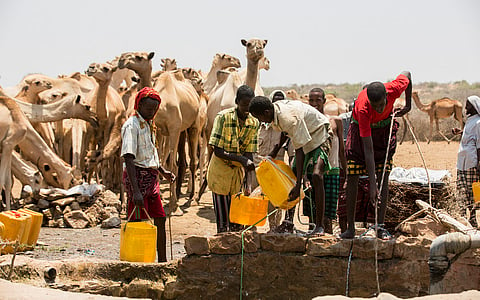

Somalia has failed to implement a functional social security system for the marginalised, particularly those negatively affected by drought. This has led to extreme poverty and lack of adequate water, livelihood, food and healthcare among those affected, prompting displacement both within internally displaced persons (IDPs) camps in Somalia and across the border into Dadaab Refugee Camp in Kenya, according to a new report by global non-governmental organization, Amnesty International.
The report, No rain, no food, no animals: The human rights impact of drought and displacement in Somalia, focuses on displacement in southern and central Somalia between 2020 and 2023, when the country experienced a four-year-long drought.
The analysis is based on interviews carried out between September 2024 and March 2025.
The research methodology involved interviewing people displaced across borders, humanitarian actors in the Dadaab camp, humanitarian and government officials in Kenya and Somalia and climate change experts.
The researchers also reviewed government reports and documents, and reports by organisations working on climate displacement in Somalia and the wider region.
Somalia is on the front line of climate change, mainly caused by humans producing and burning fossil fuels.
Assessed as the seventh most climate-vulnerable country in the world, it has experienced more than 30 climate-related extreme weather events since 1990.
The protracted four-year drought during 2020-2023 exhausted Somalia’s food reserves.
The country’s failure to protect people’s livelihoods from destruction by drought, and to provide social protection to those whose livelihoods had been destroyed, forced them to migrate into IDP camps and to Dadaab.
The drought also dried up most water points, including rivers, dams, boreholes and wells. Many families abandoned their villages and relocated because water sources could be up to 100 km away. The lack of affordable clean water forced families to rely on contaminated water, causing diarrhoea and cholera to increase during the drought.
By 2023, the number of people needing humanitarian support had risen to 8.2 million, almost half the total population of Somalia, with many requiring food, water and healthcare.
The drought has had a devastating effect on villages. Unemployment has worsened due to a collapse of businesses, which, in turn, has led to a loss of livelihoods.
As the drought worsened, the situation for small-scale traders got harder, as more people relied on the deni system for survival. Under the deni system, a family could obtain goods on credit from a shop on the premise that they would pay during harvest. Sometimes payment was made using grains or goats. However, as most crops dried up, families did not have proper harvests and had to move due to indebtedness.
Due to livelihoods being destroyed, many drought-affected families in Somalia resorted to trade in firewood or charcoal burning, further destroying the environment.
The drought also destroyed traditional social protection systems that supported at-risk family members and caused family separation.
The research shows that Somalia’s Social Protection Policy remains largely unimplemented.
Amnesty International is now urging the Somali government and its international partners to take immediate action to protect vulnerable communities, expand access to healthcare and food, and implement long-term climate resilience measures to prevent further suffering.